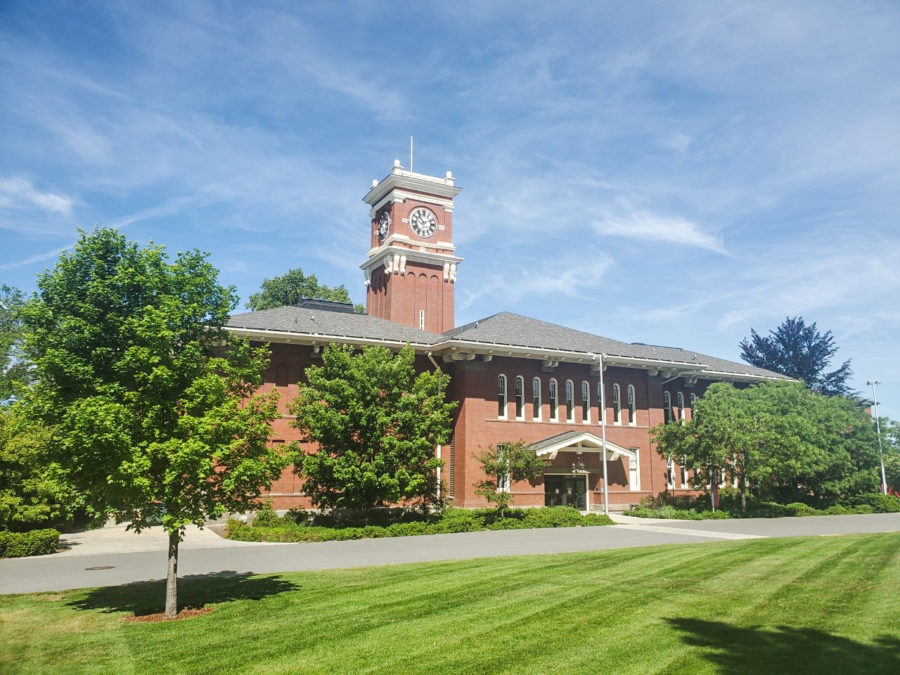WSU partners with AI-driven platform to increase international student recruitment
Office of International Programs hopes WSU will achieve 15 percent international student population through Cialfo partnership
The Office of International Programs is located in Bryan Hall, pictured here. The office wants domestic students to have the opportunity to experience and learn from WSU’s international student population, which is roughly seven percent across the system, said Daniel Saud, Office of International Programs director of undergraduate international admissions, recruitment and marketing.
June 2, 2021
WSU secured a partnership with Explore by Cialfo to increase international student recruitment and engagement.
Cialfo is an artificial intelligence-driven platform that helps students worldwide navigate their college applications, according to a press release from WSU’s Office of International Programs.
WSU is the first university in Washington state to partner with Cialfo, said Chris Elam, Cialfo’s director of higher education and partnerships.
Asif Chaudhry, WSU’s vice president of International Programs, countersigned the university’s contract with Cialfo on April 21, 2021. The contract is for one year and is renewable for three additional one-year terms, Elam said.
“We’re on a mission to make higher education accessible for 100 million students by the year 2025,” he said.
Roughly 250,000 students across 1,600 high schools around the world use Cialfo, Elam said. Cialfo is a Singapore-based “edtech” platform founded in 2012.
A partnership with Cialfo provides international students the opportunity to attend WSU, said Daniel Saud, Office of International Programs director of undergraduate international admissions, recruitment and marketing.
High school students in over 100 countries have access to Cialfo, he said.
Students work directly with their counselor(s) to create a Cialfo profile. They can decide whether they want to apply to an institution based on tuition fees, majors and living expenses, Saud said. Cialfo’s algorithm creates a network and communication system between students, high schools and higher education institutions.
Creating a Cialfo profile is free for students, Elam said. High schools pay to be on the platform.
“I want students from around the globe to have more say … and more ownership over their college application process,” Saud said. “The technology itself allows them to do that in that aspect.”
He said one of the objectives in partnering with Cialfo is to diversify WSU’s international student body by recruiting students from countries the university has never had students from before.
“AI-driven platforms are new for us,” Saud said. “After COVID, one of the things we have found is that international recruitment particularly is going to move more and more towards [using] AI. We are very excited about it because Cialfo has been a leader in recruitment for a very long time.”
Because of the COVID-19 pandemic, international student recruitment is a challenge higher education institutions face, he said. Students want to visit and interact with colleges and universities but cannot travel because of the pandemic.
Before partnering with Cialfo, Saud said the office attended Cialfo recruitment fairs.
Over the past year, he said the office has engaged with international students through virtual events. The office also relies on its network of recruiters worldwide to work with students with limited access to information and higher education.
Saud said the office has over 100 recruitment partners across the world, to include countries where students’ access to information is limited, like Afghanistan, Nepal, Pakistan and Bangladesh.
“We have a pretty robust communication with our recruitment partners in those countries to ensure that these students are receiving accurate [and] timely information, and can hopefully really see themselves here at [WSU],” Saud said.
Students across all 50 states in the U.S. attend WSU, he said. The office wants domestic students to have the opportunity to experience and learn from WSU’s international student population, which is roughly seven percent across the system.
Through its partnership with Cialfo, the office’s goal is for the international student population to double to 15 percent, he said.
The partnership allows the office to stay true to its mission in increasing student reach across the globe and providing access to higher education to international students, many of whom may be first in their families to attend college, Saud said.
“Our students on the platform have demonstrated that they would like to have the highest-ranked universities in the United States and around the world to be a part of the Cialfo network,” Elam said. “This [partnership] allows us to provide a top-tier research institution to the students on our platform.”









